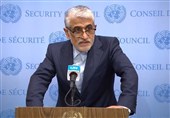Pentagon Leaks: Key Emerging Powers Avoid Backing US Standoff with Russia, China
TEHRAN (Tasnim) – An array of major developing nations seek to sit out the US’ intensifying standoff with Russia and China, an American newspaper quoted Pentagon leaks as saying.
The leaks comprise classified US intelligence assessments, which show that such countries as India, Brazil, Pakistan and Egypt try “to straddle allegiances in an era when America is no longer the world’s unchallenged superpower.”
According to the documents, President Joe Biden’s global agenda faces significant challenges as the influential aforementioned regional powers “try to remain on the sidelines” of Washington’s strife with Moscow and Beijing, sometimes capitalizing on this rivalry for their own gain, Sputnik reported.
As far as Pakistan is concerned, one of the leaked documents cited the country’s Minister of State for Foreign Affairs Hina Rabbani Khar as arguing in March that Islamabad can “no longer try to maintain a middle ground between China and the United States.”
Khar reportedly expressed concern in an internal memo that “the instinct” to preserve Pakistan’s partnership with America may damage Islamabad’s “real strategic” collaboration with Beijing.
On India, one more leaked document indicated that the country’s National Security Adviser Ajit Kumar Doval had earlier assured his Russian counterpart Nikolay Patrushev of New Delhi’s support for Moscow “in multilateral venues, also singling out India’s reluctance to support the Western-backed UN resolution over Ukraine."
Neither the White House nor the US Department of Defense have commented on the matter.
Carnegie Endowment for International Peace scholar Matias Spektor told the US newspaper that emerging powers are “recalibrating” as China expands “new economic and military clout” and Russia “demonstrates its ability to deflect Western pressure.”
“It’s unclear who will end up in a pole position in 10 years’ time, so they need to diversify their risk and hedge their bets,” the scholar added.
In the US’ new national defense strategy, which was released in late October 2022 along with the country’s Nuclear Posture Review and Missile Defense Review, the Biden administration labeled China as a “consequential strategic competitor for the coming decades,” while calling Russia an “acute threat.”
“(China) and Russia now pose more dangerous challenges to safety and security at home, even as terrorist threats persist,” the document claimed, adding that both countries have deployed space capabilities that could purportedly target the US’ GPS and other “space-based capabilities that support military power and daily civilian life.”
Speaking to reporters after the strategy’s release at the time, US Defense Secretary Lloyd Austin argued that while Russia “can’t systemically challenge the United States over the long term,” unlike China, it “does pose an immediate and sharp threat to our (American) interest and values.”
As for the classified intelligence documents, they have been leaked on social media sites in the past several weeks, in particular providing intelligence on a spate of sensitive security matters related to the conflict in Ukraine, including Ukrainian air defenses, Russian military activities, and US assessments of the standoff.
The Pentagon confirmed that the documents “appear to contain sensitive and highly classified material,” but insisted that at least some have been doctored. The Russian Foreign Ministry in turn suggested that the leaks might be fake and reflect a deliberate attempt to mislead Moscow.






